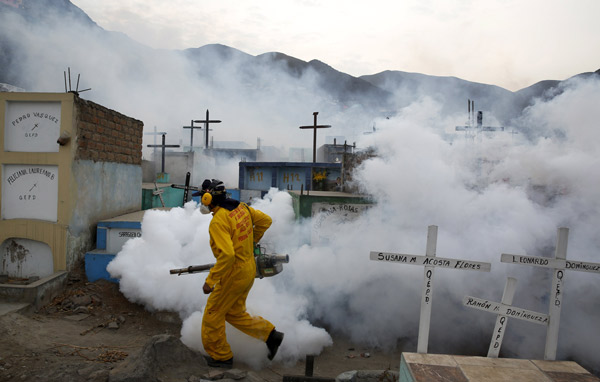Australia's northern states braced for possible outbreak of Zika virus
(Xinhua) Updated: 2016-02-02 10:58
 |
|
A health worker carries out fumigation as part of preventive measures against the Zika virus and other mosquito-borne diseases at the cemetery of Carabayllo on the outskirts of Lima, Peru, Feb 1, 2016. [Photo/Agencies] |
CANBERRA - Australia's northern states are in the process of safeguarding themselves against the spread of the Zika virus, which the World Health Organization (WHO) has declared a "global health emergency".
Queensland's Health Minister Cameron Dick on Tuesday said the disease could travel across the Torres Strait, from neighboring countries such as Papua New Guinea, and into the northern regions of three Australian states: Queensland, Western Australian and the Northern Territory.
These states are more likely to become pathways for the Zika virus due to their tropical and sub-tropical climates which are known breeding grounds for the disease's carrier, Aedes aegypti mosquitoes.
A Queensland health council, based on Cape York, a remote peninsula in the state's far north, has urged locals to take precautions to prevent the airborne virus entering Australia.
"We are a potential area for spread," Dr Mark Wenitong of the Apunipima Cape York health council told the Australian Broadcast Corporation on Tuesday.
"We want to make sure everybody cleans up and does the things they can to prevent this starting in Cape York."
Dick said the Queensland government was already looking for cases of the virus in Papua New Guinea and other surrounding regions in Torres Strait.
Dick added that he may seek the support of the federal government to coordinate an Australia-wide response to the disease.
The Zika virus has been linked to 4,000 cases of babies born with abnormally small brains in the South American nation of Brazil. However, the correlation is yet to be scientifically proven.
Despite the lack of proof and reports that the virus has been circulating for years, the WHO - criticized for their response to the outbreak of the Ebola virus in West Africa two years ago - convened an emergency meeting on Monday to assess the situation.
WHO chief Margaret Chan told Melbourne radio on Monday that Australia would need to pull its weight as part of the international effort to contain the outbreak.
"The evidence is growing and is getting strong," Chan said.
"We need a coordinated international response to make sure we get to the bottom of this."





